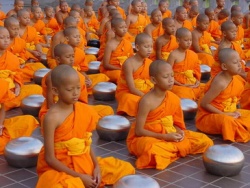Buddhist Education
When I began writing for this website almost three years ago, I had been practicing Buddhism for several years. I thought I had a pretty good grasp of basic teachings. One of the most significant things I've learned over the past three years is how much I didn't know.
Take the Eightfold Pathr example. It had been waved in my face by several earnest teachers, yet when the time came to write about it I realized I was pretty hazy about many of the "folds." The Eightfold Path didn't seem terribly interesting to me, to tell you the truth. But over the past three years I've written an article about each part of the path, and as I've learned more about them I've come to see how important they are (see the last three blog posts for more).
I read awhile back about some Theravada teachers who were frustrated that their western students never wanted to learn about the Precepts. They were enthusiastic about the meditation, but didn't want to be bothered with lectures about doctrine, thank you very much.
I understand this. Many of us, including me, first came to practice because we were looking for something to "fix" us, or help us turn our lives around in some way. Or, we may be yearning for some spiritual experience, which was lacking in our religious traditions-of-origin.
What we're often not in the market for is someone standing over us with what seems to be a list of rules about not killing, not stealing, etc. Been there, done that.
In my case, I began to sit zazen because I thought it would be good for me. So I went to zazen workshops, and then retreats, and eventually went through an initiation process to become a "formal" Zen student. And then one day, after I'd been a student for two or three years, I heard a talk on the Four Noble Truths that brought Buddhism "home" for me.
In Zen training it's common to not go into doctrine very much until the student has been sitting zazen for a while, and I think there is some wisdom in that. There may have been nothing in that talk that I hadn't been told before, but on that day I finally was ready to hear it.
But for many of us in the west, our "education" in Buddhism is mostly hit-and-miss. We go to this retreat or read that book, and we pick up pieces here and there, but many of us never receive the kind of education in Buddhism that shows us all of the pieces and how they all work together.
And, like me, people don't always know what they don't know. Sometimes people are exposed to some little slice of Buddhism that they find entirely satisfying, and they don't bother to learn more. And that's fine; there are no "shoulds" on the spiritual path. But in many cases people seem unaware there is more to Buddhism than what they know, and they don't appreciate why the other stuff might be important.
And beware of being "satisfied." Dogen said, "When dharma does not fill your whole body and mind, you think it is already sufficient. When dharma fills your body and mind, you understand that something is missing." That's one of those enigmatic Zen sayings, I know, but I believe he's saying that a little slice of dharma might be entirely satisfying, but whole-body-and-mind dharma shows us a door to be opened, and we cannot rest until we've opened it.
Another not-uncommon problem is that when you study books and sutras by yourself, with no teacher to guide you, it's highly probable you'll misunderstand much of it. This is partly because the English translations are all flawed -- some things can't be translated -- and partly because the dharma itself in ineffable -- some things can't be explained with words.
I am very fortunate, not only to have this website but to have a nearby teacher -- more than one, actually -- and to be a fully participating member of a community of Zen students. That wasn't always the case for me, and I realize it isn't the case for many of you, but it makes a huge difference.
Anyway -- Those of you who are regular members or attendees of a dharma center of some sort might consider what kind of education the center is offering. If you think your dharma center is doing a particularlyI good (or bad) job of teaching all the parts, let's hear about it.
Also, if there's any particular part of Buddhism you find particularly murky and mystifying, speak up. There's much that isn't clear for me, either, so don't feel shy about speaking up.


